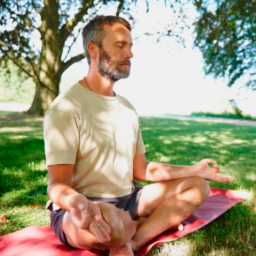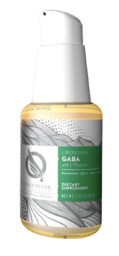
Sleepless nights have tired us all at some point. Reactions in the fight-or-flight system (the sympathetic nervous system) create many adaptations in the body – how we sleep being one of them. Anxiety, worry, uneasiness, stress, lack of inner peace – these are all signals from our sympathetic system when we sense danger or feel stress.
Did you know that anxiety is such a common human condition because the sympathetic nervous system is actually our automatic default? It’s one of our built-in, natural defense mechanisms. Consider this: You do not want to think about running from the tiger, your body just puts you in that state and says, “You’re welcome!” The sympathetic tone comes from a very primal side to us, one that we share with any flight animal, like deer for example.
Are You Sleeping Like a Flight Animal?
I am trying to tame the deer in my neighborhood. I love watching them and I feed them every morning. At first, they would run off if I even looked at them, but now, I can get within 10 feet of them. One of the deer actually gave birth to her fawn in my grove trees. We are making progress, but if I drop something or make a sudden move, they still split in a matter of seconds. Deer are flight animals because they fall prey to other carnivores. They are always on alert – even when bedding down for the night. Deer sleep about 4.5 hours a night, but only 30 minutes of deep (REM) sleep. Outside of the REM sleep, researchers show that deer are not “sleeping” but in a state of drowsiness.
If this is similar to your sleep pattern, then you are starting to sleep like a flight animal. For humans – research has shown that we need at least 7.5 hours of sleep a night. Some people even need 9 hours. If you are someone who claims they only need 6 hours of sleep, you’re kidding yourself. Many things happen when you are asleep – digestion, liver detoxification, growth hormone secretion to heal tissues, learning, memory formation, and reduction in anxiety all happen within that 7.5 hours of sleep. Anything less is short-changing your body and your mind.
When assessing sleep issues, consider two main variables: Do you have trouble falling asleep, staying asleep, or both? This can help guide you to the appropriate therapy.
When You Can’t Fall Asleep
First, if you don’t fall asleep well, consider a possible lack of melatonin. Your pineal gland secretes melatonin when the sun goes down. But, if you are parked in front of a computer, cell phone, tablet, or TV before sleep, your brain misses the cue because of the light from the electronic device. This means your melatonin is deficient.
You also need enough serotonin to make the melatonin secretion. Serotonin drops over time in the face of chronic anxiety or stress. This, plus screentime, means we don’t fall asleep well. You can take over-the-counter melatonin – adult dosages are 0.5 mg – 6.0 mg. Melatonin can be taken in higher doses, but be sure to consult your healthcare provider first.
People always ask if you take melatonin, does your body stop making it? Can you become dependent on melatonin? No, melatonin is not addictive and there is no evidence that you stop making your own melatonin if you supplement. High-dose melatonin (10-50 mg) is used in cancer therapies. These patients can take this for months and go off cold-turkey. What never happens? Withdrawals. This is how we know becoming physically dependent is not a concern with melatonin.
What are the signs you don’t need melatonin? If you take a dose that is too much for you, crazy dreams and feeling groggy the next morning are signals you need to cut the dose down, or stop taking it.
When You Can’t Stay Asleep
Melatonin helps us fall asleep, but is not the key to staying asleep. We must feel safe, calm, and relaxed to fall asleep. Remember the deer – they know they are someone else’s dinner, that is a lot. So to adjust for that stress, they sleep lightly. Now, you may not have something hunting you, but your “predator” could be stress! Stress related to work, family dynamics, deadline pressures, financial woes, you name it.
In this case, we need to tone the parasympathetic or, the rest-and-digest, system. Doing this starts with awareness. Throughout your day, strengthen the parasympathetic to match your strong sympathetic system by deep breathing.
Breathing & Meditation Tips
How do you breathe? Are you a shallow, upper-lung breather predominantly? This is a sympathetic response. You need to activate your lower part of the lungs, where the vagus nerve innervates and brings calm to your body. The lower lung activation releases your own body’s GABA (Gamma Amino Butyric Acid), the calming neurotransmitter.
There are many types of breathing techniques. I typically teach “Vagus Nerve Breathing.” But, all deep breathing works – do what you like. The point of it all is to get stimulation through your lower lungs – the great overdrive to the sympathetic tone. With vagus nerve breathing, fill up your lungs and count how long that takes – usually 4-5 seconds, then exhale for double that amount of time. For example if it took you 4 seconds to breathe in fully, you would exhale at the speed of 8 seconds. Some people are so tightly wound, I have them do this once an hour for 5-10 minutes. Just like any adaptation in the body, it takes toning and time. You may not think breathing is working, but it will, you just have to keep at it.
Meditation is a natural next step from deep breathing. I admit I was one of those people who said “meditation doesn’t work for me.” But, I kept at it and now it is the main tool I use for controlling stress. Even 5 minutes helps. There is a saying: If you feel like you don’t have 5 minutes to meditate, you likely need 10. This means, your brain’s sympathetic tone is ruling you. Everyone can meditate and breathe – you have to break out of the belief that holds you back.
To sustain your sleep – you need that parasympathetic tone, which is easily lost to the sympathetic. You see, our parasympathetic system is not automatic like our sympathetic one – it is willful. Meaning, you need to bring some body awareness to your anxiousness and then counter that with your parasympathetic response and as mentioned above, breathe deeply. But, here is a paradox. The better you sleep, the better your parasympathetic tone. The less you sleep, the more short-changed your parasympathetic system. I worked once with a psychiatrist who declared, “You cannot help anxiety if someone doesn’t sleep well.” One of your first questions for someone who has anxiety is, “How well do you sleep?” The answer to this will let us know how maladapted the parasympathetic tone is.
If you wake up frequently throughout the night, your body is trying to detect and respond to danger. Maybe your workplace is a lion’s den of fear, pressure, and the unexpected. This means, throughout your work day, you need to find those 3-5 minutes to deep breathe and meditate. In actuality, the more you do this, your parasympathetic brain operates better. Parasympathetic mind is where your problem-solving, creativity, critical thinking, memory, innovation, and deep thoughts come from. The sympathetic tone is just about alarming you. Parasympathetic is where we truly think.
Rumination is often a common sign when someone has sleep issues. The worried, “what-if” thinking becomes strong when we are trying to sleep. Overthinking gives power to your fear. And let’s be honest, when we are in our anxious mind, we are often acting and behaving out of fear. It is a distress signal – but the solutions don’t come from your peers reassuring you, it has to come from you. You are in charge of your mind and learning to calm your brain improves memory, mood, learning, and hormone regulation and tissue repair.
When It’s Time for a Sleep Supplement
In the beginning, tuning up the parasympathetic system can require help in the form of supplements.
- GABA, L-Theanine, and the nervine herbs can really help. Quicksilver Liposomal GABA with L Theanine is a product I use very often, mostly because it is convenient and it combines nutrients. It is an easy, tasty liquid that you just take by mouth.
Back when I was struggling with meditation, I found taking L-Theanine really helped me relax. L-Theanine is an amino acid that helps GABA onto the receptor. Like I mentioned, you release your own GABA when you take a deep breath. You can also take over-the-counter GABA (called PharmaGABA). Most of the time I have people start out with L-Theanine at various dosages depending upon their needs. If we don’t find relief, adding PharmaGABA helps. Often you have to personalize the dosages, so working with a healthcare professional is best. Both of these don’t have many drug interactions, but have been known to lower blood pressure. If you are taking blood pressure meds, your blood pressure may drop even lower. While this fact is reported as a warning, it is actually a signal you can talk to your doctor about lowering those meds.
When deep breathing and stress management are just not enough yet, you may have to do something we call “sleep training”. This means, coupled with deep breathing, meditation, and shutting down screens, we may need to take a sleep-supportive supplement. My two favorites are Kavinace OS by NeuroScience and Insomnitol by Designs for Health.
- Kavinace OS is a combination of magnesium (a calming vitamin that slows the sympathetic response), L theanine, but also resveratrol and astaxanthin. In addition to resveratrol’s anti-inflammatory, antioxidant, antitumor, and estrogen modulation properties, it has also been studied for use in improving sleep wake cycles especially in people with sleep apnea.
- Astaxanthin is an antioxidant carotenoid from krill, salmon, and algae. It has been well studied to improve sleep quality in addition to improving mood in depressed patients. The studies also report significantly improved morning wakefulness after a night supplementing.
- Insomnitol by Designs for Health is a combination much similar to Kavinace OS, but uses calming herbs such as valerian root, lemon balm, and passiflora. Valerian is the herb from which the medication valium is extracted. In studies, valerian has been shown to improve GABA secretion and suppress an abnormal sleep arousal (in other words, helps you sleep deeper to stay asleep). However, some people do have a paradoxical effect with valerian and it can increase their energy.
- Lemon balm and passiflora are both herbs that work in a similar way. They are classified as the nervines – herbs that boost GABA. Very few drug interactions occur with these herbs and they can be consumed as teas throughout the day to alleviate stress.
When we sleep train with these supplements, we do want to emphasize that deep breathing and meditation should be utilized as a habit, that once taken hold, you will no longer need the supplements. Correcting poor sleep may need a month or two of supplements, then the training wheels can come off and we can take over with good habits. I usually tell people if you have two nights of bad sleep, that third night it is ok to take something. Eventually, your body will get back to the normal sleep rhythm and you will do less flight animal sleep.
The worst possible advice is, “Don’t be so stressed.” The stressors in your life may not all go away, but your reactions to them will reduce the physiology adaptation in your body. Yes, set better boundaries, strive for a better work-life balance, and seek therapy. Train yourself to be calm in triggering situations; your body will thank you. Good night.
If you have comments and/or questions about this blog, email us at blog@peoplesrx.com.

Amy Nelson, ND* received her Naturopathic Doctorate from the National College of Natural Medicine in Portland, OR where she studied nutrition, homeopathy, herbal and functional medicine. In addition, Dr. Nelson was the Associate at The IBS Treatment Center in Santa Monica where she treated irritable bowel syndrome and complex food allergies. Dr. Nelson utilizes her experience in natural medicine to address female and male hormonal imbalances, mental health, and digestive disorders. Amy is available for consultation at: DrAmyNelsonND.com.
*Although licensed in other states, Naturopathic Doctors are not currently licensed in Texas. To support licensure efforts, please visit www.txand.org.
References:
1. https://westchesterwildlife.com/
2. https://www.cdc.gov/sleep/about_sleep/how_much_sleep.html
5. National Center for Biotechnology Information. PubChem compound summary for CID 445154, resveratrol. https://pubchem.ncbi.nlm.nih.gov/compound/Resveratrol. Accessed June 8, 2021.
6. Malaguarnera L. Influence of resveratrol on the immune response. Nutrients. 2019;11(5):946
7. Hayashi M, Kawamura M, Kawashima Y, Uemura T, Maoka T. Effect of astaxanthin-rich extract derived from Paracoccus carotinifaciens on the status of stress and sleep in adults. J Clin Biochem Nutr. 2020 Mar;66(2):92-102. doi: 10.3164/jcbn.19-113. Epub 2020 Feb 14. PMID: 32231404; PMCID: PMC7093296.


